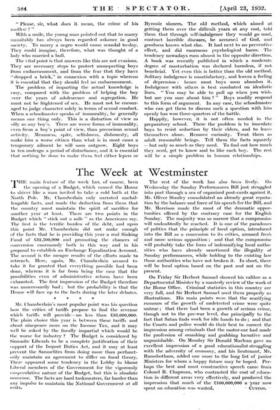The Week at Westminster
'111IE main feature of the week has, of course, been the opening of a Budget, which caused the House to shiver like a man invited to take a cold bath at the North Pole. Mr. Chamberlain only narrated unchal- lengable facts, and made the deduction from them that the country must maintain the spirit of sacrifice for another year at least. There are two points in the Budget which " stick out a mile " as the Americans say. The first is the terrific burden of the debt, and upon this point Mr. Chamberlain did not make enough of the facts that he is providing this year a real Sinking Fund of :C32,500,000 and promoting the chances of conversion enormously both in this way and in his proposal to establish an Exchange Equalization Account. The second is the meagre results of the efforts made to retrench. Here, again, Mr. Chamberlain seemed to take it for granted that everything possible had been done, whereas it is far from being the case that the possibilities even of administrative reform have been exhausted. The first impression of the Budget therefore was unnecessarily bad ; but the probability is that the House will face up to the facts during the later debates.
* * * * Mr. Chamberlain's most popular point was his question how the critics of tariffs propose to find the revenue which tariffs will provide—no less than £33,000,000. The plain choice this year is between these tariffs and about ninepence more on the Income Tax, and it may well be asked by the fiscally impartial which would be the worse for industry ? The Budget is considered by Simonite Liberals to be a complete justification of their support of the Import Duties Act, and it may at least prevent the Samuelites from doing more than perfunct- orily maintain an agreement to differ on fiscal theory. There appeared some tendency in the Lobby to blame Liberal members of the Government for the vigorously unspeculative nature of the Budget, but this is absolute nonsense. The facts are hard taskmasters, far harder than any impulse to maintain the National Government at all costs. The rest of the week has also been lively. On Wednesday the Sunday Performances Bill just struggled into port through a sea of organized post-cards against it. Mr. Oliver Stanley consolidated an already great reputa- tion by the balance and force of his speech for the Bill, and Mr. Morrison made the most of the dramatic oppor- tunities offered by the contrary case for the English Sunday. The majority was so narrow that a compromise will undoubtedly be reached. It is one of the paradoxes of politics that the principle of local option, introduced into the Bill as a concession to its critics, aroused fresh and more serious opposition ; and that the compromise will probably take the form of indemnifying local autho- rities who have akeady sanctioned the • illegality of Sunday performances, while holding to the existing law those authorities who have not broken it. In short, there will be local option based on the past and not on the present.
On Friday Sir IIerbert Samuel showed his calibre as a Departmental Minister by a masterly review of the work of the Home Office. Criminal statistics in this country are very full, and Sir Herbert Samuel used them properly as illustrations. His main points were that the scarifying rumours of the growth of undetected crime were quite untrue ; that there had been a growth of serious crime, though not to the pre-war level, due principally to the fact that Satan finds work for idle hands to do ; and that the Courts and police would do their best to Correct the impression among criminals that the motor-car had made the profession of smashing and grabbing lucrative 'and unpunishable. On Monday Sir Donald Maclean gave an excellent impression of a good educationalist struggling with the adversity of economy, and his lieutenant, Mr. Ramsbotham, added one more to the long list' of junior Ministers for whom a happy future may be hoped. Per- haps the best and most constructive speech came froth Colonel R. Chapman, who contrasted the 'cost .of educa- tion in different areas very effectively, and produced the impression that much of the £100,000,000 a- 'Year now
spent on, edueation was wasted, "CuSTos.






































 Previous page
Previous page